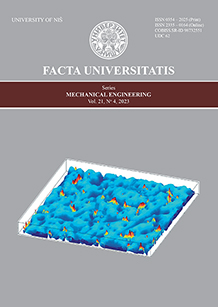使用奥林匹亚优化算法的分布式系统数据复制
IF 11.8
2区 工程技术
Q1 ENGINEERING, MECHANICAL
引用次数: 0
摘要
在物联网(IoT)平台等大型分布式系统中,实现对数据对象的及时访问是一个主要挑战。因此,在分布式系统中,最小化数据读写操作时间已成为系统设计师和机械工程师优先考虑的问题。复制以及在最易访问的数据服务器上适当放置副本是np完全优化的一个问题。当前研究的主要目标是最小化数据访问时间、减少副本数量和提高数据可用性。本文采用奥林匹德优化算法(Olympiad Optimization Algorithm, OOA)作为一种新颖的基于种群的离散启发式算法来解决副本放置问题,该算法也适用于其他领域,如机械和计算机工程设计问题。这种离散算法的灵感来自于准备奥林匹克考试的学生群体的学习过程。该算法基于分治策略,结合局部和全局搜索策略,用于解决标准模拟分布式系统中的副本放置问题。采用“欧盟数据库”(EUData)来评估所提出的算法,该算法包含28个节点作为服务器和完整图格式的网络架构。结果表明,所提出的技术在大约6个副本的情况下减少了39%的数据访问时间,这大大优于早期的方法。此外,该算法不同执行结果的标准差约为0.0062,低于其他技术在相同实验中的标准差。本文章由计算机程序翻译,如有差异,请以英文原文为准。
DATA REPLICATION IN DISTRIBUTED SYSTEMS USING OLYMPIAD OPTIMIZATION ALGORITHM
Achieving timely access to data objects is a major challenge in big distributed systems like the Internet of Things (IoT) platforms. Therefore, minimizing the data read and write operation time in distributed systems has elevated to a higher priority for system designers and mechanical engineers. Replication and the appropriate placement of the replicas on the most accessible data servers is a problem of NP-complete optimization. The key objectives of the current study are minimizing the data access time, reducing the quantity of replicas, and improving the data availability. The current paper employs the Olympiad Optimization Algorithm (OOA) as a novel population-based and discrete heuristic algorithm to solve the replica placement problem which is also applicable to other fields such as mechanical and computer engineering design problems. This discrete algorithm was inspired by the learning process of student groups who are preparing for the Olympiad exams. The proposed algorithm, which is divide-and-conquer-based with local and global search strategies, was used in solving the replica placement problem in a standard simulated distributed system. The 'European Union Database' (EUData) was employed to evaluate the proposed algorithm, which contains 28 nodes as servers and a network architecture in the format of a complete graph. It was revealed that the proposed technique reduces data access time by 39% with around six replicas, which is vastly superior to the earlier methods. Moreover, the standard deviation of the results of the algorithm's different executions is approximately 0.0062, which is lower than the other techniques' standard deviation within the same experiments.
求助全文
通过发布文献求助,成功后即可免费获取论文全文。
去求助
来源期刊

Facta Universitatis-Series Mechanical Engineering
ENGINEERING, MECHANICAL-
CiteScore
14.40
自引率
2.50%
发文量
12
审稿时长
6 weeks
期刊介绍:
Facta Universitatis, Series: Mechanical Engineering (FU Mech Eng) is an open-access, peer-reviewed international journal published by the University of Niš in the Republic of Serbia. It publishes high-quality, refereed papers three times a year, encompassing original theoretical and/or practice-oriented research as well as extended versions of previously published conference papers. The journal's scope covers the entire spectrum of Mechanical Engineering. Papers undergo rigorous peer review to ensure originality, relevance, and readability, maintaining high publication standards while offering a timely, comprehensive, and balanced review process.
 求助内容:
求助内容: 应助结果提醒方式:
应助结果提醒方式:


